Closing Costs for FHA Loans

Closing costs encompass all the fees and charges owed at the closing of a mortgage. The FHA outlines "allowable" closing costs that may be reasonably charged to the borrower. The non-allowable costs are paid by either the seller or lender. Some closing costs are charged by the mortgage lenders, and others come from third parties such as home appraisers and title companies.
Closing Costs You Can Expect
The usual closing costs include appraisal fees, inspection fees, cost of credit reports, lender's origination fees, deposit verification fees, home inspection fees, cost of title examination and title insurance, document preparation charges, property surveys, attorney's fees, recording fees, and the cost of transfer stamps and taxes, to name a few.
According to the Federal Reserve, FHA closing costs typically amount to an average of 3% of the property’s purchase price, but this number can change based on location, as some states charge higher taxes. Depending on where you choose to buy a home, your closing costs can amount to as much as 6% of the purchase price.
In addition to location, a borrower’s choices can affect the amount they pay at closing. For instance, a borrower may choose to pay discount points to lower their interest rate. But this also means they increase their overall closing costs. This decision is ultimately made according to what the borrower can afford. Some find it easier to make higher upfront payments and lower the overall interest they pay on the loan. Others have less disposable income and choose to keep their closing costs low by foregoing the discount points and lower interest rate.
Loan Estimate and Closing Disclosure
It’s difficult to come up with an average number for FHA closing costs. That’s why the Consumer Financial Protection Bureau (CFPB) implemented the "Know Before You Owe" mortgage disclosure rule. It mandates that all lenders give borrowers a Loan Estimate of their FHA closing costs shortly after they apply for a loan. This document goes over the ins and outs of the mortgage terms, allowing borrowers to easily compare the mortgage costs with that of the competition. Lenders are then required to give borrowers the Closing Disclosure three days before closing. This is an updated document that shows what your actual costs will be.

FHA Loan Articles
August 14, 2023FHA loans typically require a minimum down payment of 3.5% of the purchase price of the home with the right credit score. This means that if you're buying a house for $240,000, you would need to make a down payment of at least $8,400.
August 10, 2023FHA loans have specific rules and requirements for borrowers who have filed for bankruptcy. The guidelines can change over time, so it's essential to consult with a qualified lender or FHA-approved counselor for the most up-to-date information.
August 3, 2023FHA loans are primarily designed to help individuals and families purchase homes for use as their primary residences. Rules for these loans generally discourage their use for investment properties or rentals. However, there are exceptions that come with strict rules.
July 29, 2023One crucial aspect of FHA loans that borrowers need to understand thoroughly is debt ratios. In this article, we look at how they can impact your ability to secure financing for your dream home. Debt ratios help lenders understand a borrower's creditworthiness and any risks associated with the loan.
July 21, 2023Investing in a multi-unit property can be an excellent way to build wealth through rental income and property appreciation. FHA multi-unit property loans make this opportunity more accessible to a broader range of individuals. You must occupy a unit as your primary residence within 60 days of closing the loan.
July 15, 2023To qualify for an FHA loan, you must meet certain employment requirements. In this article, we'll dig into the FHA loan employment requirements so that you can understand what's needed to get approved for this type of mortgage.








